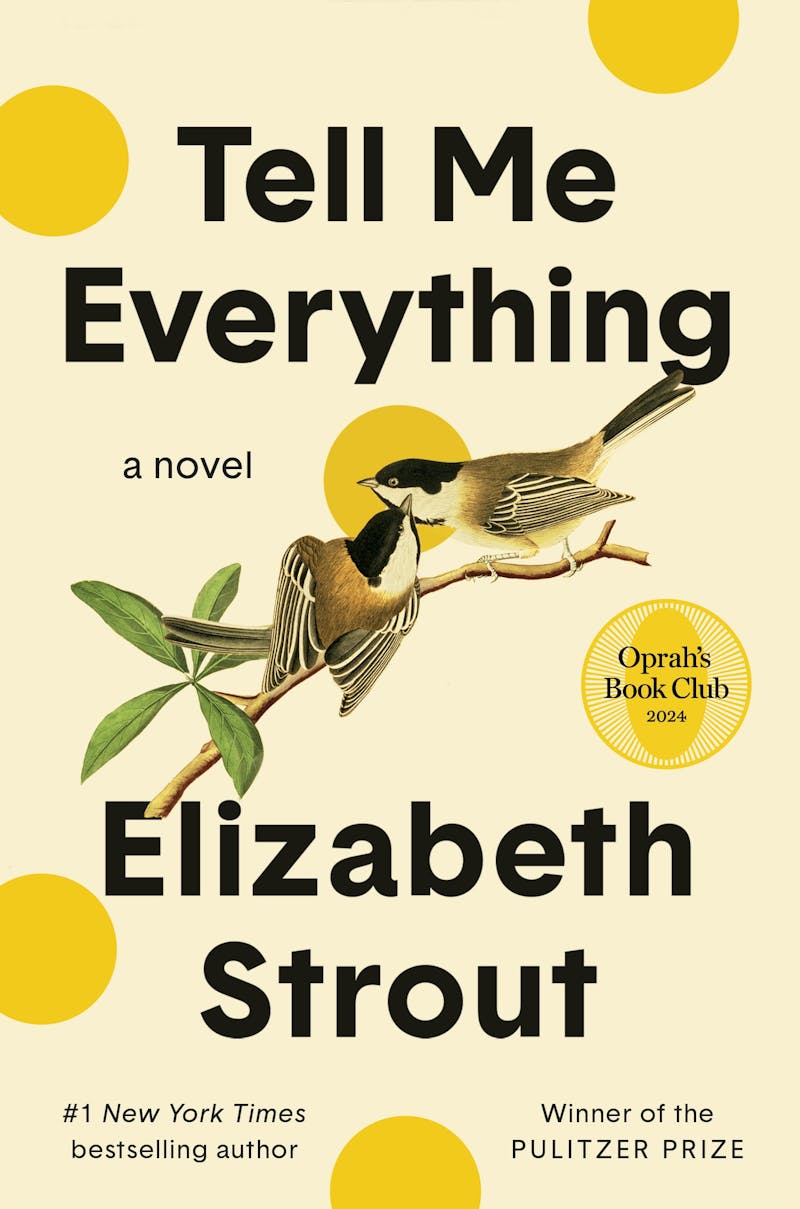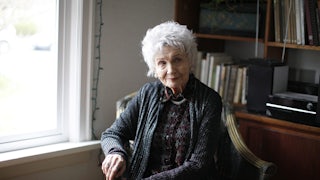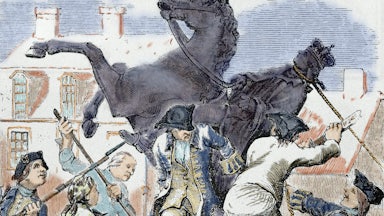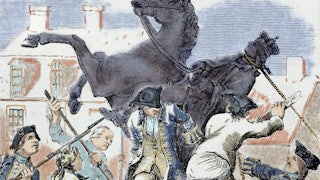Early in Tell Me Everything, Elizabeth Strout’s latest novel, the retired teacher Olive Kitteridge reads all of the memoirs by Lucy Barton, a New York City writer who arrived in her coastal Maine town during the pandemic. At Olive’s request, an acquaintance named Bob Burgess has arranged for the two women to meet. “Olive did not know if Lucy was a famous writer or a not quite famous writer,” Strout writes, “but she decided it did not matter.”
Lucy isn’t Strout, but Lucy’s (fictional) memoirs are Strout’s (real-life) novels: My Name Is Lucy Barton (2016), Oh William! (2021), and Lucy by the Sea (2022). And as serious novelists go, Strout is a “famous writer”: Olive Kitteridge (2008) won the Pulitzer, and an HBO limited series adaptation swept the Emmys; My Name Is Lucy Barton became a one-woman Broadway play; both Olive, Again (2019) and Tell Me Everything are selections of Oprah’s Book Club.

Strout’s fiction has an unlikely appeal. In “Writing the Other America,” a recent essay in The New York Review of Books, Pankaj Mishra notes Strout’s interest in the lives of the very old as well as the very poor. But whatever else she is writing about, she is always writing about loneliness. As children, Lucy Barton and her siblings were shunned because they smelled. Lucy also knows the loneliness of being a born writer in an environment that had little use for her sensitivity. Bob Burgess is isolated by extreme guilt: For most of his life he has believed himself responsible for an accident that killed his father. Olive Kitteridge has been lonely in both marriage and widowhood, and is pretty much a lifelong community outcast. Though Strout peers into these lives with warmth and compassion (and favors cozy titles like Tell Me Everything and Anything Is Possible), she has tended to do so without sentimentality.
And yet her recent novels, including the latest, are not as adept at treading that line. Tell Me Everything revolves mostly around Olive and Lucy, who sit and swap stories, and Bob and Lucy, who walk and do the same (they started strolling together during the pandemic), but there are several subplots. In one of them, Bob’s brother, Jim, is catapulted by a son’s accident into “another world, a world where all he felt was love and sorrow, and yet the love was stronger than the sorrow.” Strout describes this period in elated, somewhat soppy terms:
It was strong, and when his girls came to visit, he felt as though the country he had been living in had shifted abruptly, and for whatever reasons—was it a gift from God?—he was now in an altogether different country, and it was a country of purity.
Jim feels this way for two weeks, which seems about right. Strout’s omniscient narrator spends the entire novel in this state, overwhelmed by fellow feeling and often sounding indistinguishable from Lucy Barton herself. Lucy, in a one-sentence paragraph from Strout’s previous novel: “Everyone needs to feel important.” The narrator in Tell Me Everything, another stand-alone sentence: “And who—who who who in this whole entire world—does not want to be heard?” If Strout was once a master at portraying quiet lives in a big way, letting them unfold and trusting readers to draw their own conclusions, she now relies on easy plays for emotional connection and tidy resolution.
Even loneliness is now something about which to generalize wanly in Tell Me Everything. “We are all lonely,” Lucy tells Olive. “Show me one person who is not lonely.” Olive points to the residents of her adult community who gather daily to drink wine—“snot wots,” she calls them. I’d point to Lucy herself, who, despite her insisting she’s “so good at being lonely,” has never had less reason to be. She is back together with her ex-husband, William; meanwhile, her feelings for Bob Burgess have warmed and deepened, as have his for her. Because Bob has been contentedly married for 15 years to a minister named Margaret, Strout has a superb subject here, more rewarding than anything else in the novel. What happens when two people with satisfying personal lives suddenly find that they can talk to each other as to no one else, and are understood by each other as by no one else?
“It was innocent,” Strout writes, “because both Bob and Lucy were—in a strange, indefinable way—innocent people.” Many who are in love with an unavailable person may think themselves innocent, but Bob and Lucy actually are, and not at all indefinably. They do not sneak around. They do not even confess their feelings to each other. Jim Burgess counsels his brother to control himself: “You can live with being in love with her, hard as it is, but you will not be able to live with yourself if you touch her. You’re Bob Burgess. I know you.” It’s been said that Strout is for the most part kind to her men, but one thing that separates them from so many contemporary male protagonists is that they are quietly tough on themselves. Delivering groceries to a housebound woman, Bob is asked to stay for a few minutes. “Time had not moved so slowly since geometry class in high school,” he thinks, but he stays for an hour. At his most tortured over his entirely chaste relationship with Lucy, Bob decides to reward himself with a donut if he goes an hour without thinking about her: “He did not eat very many donuts.”
The problem with Tell Me Everything is that everyone is innocent, or at least absolved, including a minor character who commits homicide. The murderer is so severely damaged that only the most heartless of us, if asked to sit in judgment, would not have mercy. Yet Strout never calls on us to decide if we can extend this mercy: The suspect conveniently exits the novel before being arrested, so that neither we nor her characters need wrestle with questions of crime and punishment.
Strout plays it safe with others too. An unkempt, friendless man in his late fifties who lives with his mother, no longer works, doesn’t date, and is thought a pervert because he paints pregnant women in the nude turns out to be not only surpassingly gentle and decent but an artist of brilliance—self-taught, to boot. “Jesus,” Bob Burgess says when he sees the paintings, which he thinks “should be in a gallery in New York.” Plausible, yet this good man would be no less interesting if he were an only mediocre painter. All of Strout’s novels remind us that appearances deceive, but while the early ones uncover lives much harder than strangers might assume, the later ones insist that, almost without exception, human beings are nobler than even their intimates realize.
What happened to Strout? The writing does not feel lazy or complacent. Nor, despite an almost comical amount of hemming and hawing in the dialogue, would I exactly call it timid. But it is cautious, determinedly inclusive—as if Strout cannot bear to leave a single human song unsung, even when that means straining to soften the harsher notes. (Should anyone doubt her devotion to the big tent that is her audience, the dedication of Oh William! reads in part, “And to anyone who needs it—this is for you.”) One registers too a growing politeness about politics. After Olive Kitteridge, Strout received hate mail about Olive’s disdain for an unnamed George W. Bush. In the first novel about Lucy, a novelist mentor of hers named Sarah Payne receives hate mail for an unflattering portrayal of Ronald Reagan. On a panel, the novelist defends herself: “It’s not my job to make readers know what’s a narrative voice and not the private view of the author.” Pressed for her own opinion of the former president, Payne finally offers it: “I would say, the woman I made up lets him off quite easily.”
Since then, though, Strout has seemed to abide by a fairness doctrine. Olive reviles Trump, but the Trump supporters she gets to know are invariably the salt of the earth; a nurse’s aide’s life makes her own, she realizes, look “remarkably easy.” Lucy By the Sea gives us a scene in which the title character, humiliated by a visit to a college class in which the students sneer at both her and her work, suddenly sympathizes with the January 6 insurrectionists: “What if all the jobs I had taken in my life were not enough to really make a living.… They had been made to feel poorly about themselves, they were looked at with disdain, and they could no longer stand it.” Lest anyone with Strout’s own views recoil from this rather selective portrayal, it is replaced in the next paragraph with another: “And then I thought, No, those were Nazis and racists at the Capitol. And so my understanding—my imagining of the breaking of the windows—stopped there.” With the tact of the consummate host, Tell Me Everything steers clear of political gibes. Gone is all talk of “that horrible orange-haired man,” and a conservative named Charlene Bibber is now someone whose views are merely “very different from most people in this mostly liberal town.”
While reading Tell Me Everything, I thought often of a period early in Strout’s career when she had difficulty publishing. “I got fixated on the idea that there was something I was being untruthful about,” Strout has said, and she took a course at the New School that changed her life. It was not a writing workshop but a stand-up comedy class. “We laugh at things because they’re true.… So I thought, what would happen if I were in front of people in a pressure-cooker situation and I was supposed to make them laugh? What would come out of my mouth?” The final exam was a performance at a comedy club. Many students dropped out, but Strout stuck with it. She succeeded on the exam, making fun of herself as “an uptight white woman from New England,” and went on to publish Amy and Isabelle (1998)—the furthest thing from a comic novel and one richer in ambiguities than Tell Me Everything.
If Strout were to repeat her stand-up comedy class today, I wonder if she would dare to poke fun at anyone but herself. Would she worry that she’d been mocking her own characters, her own readers—punching down—if the audience laughed? More important, I wonder what she’d write next.






